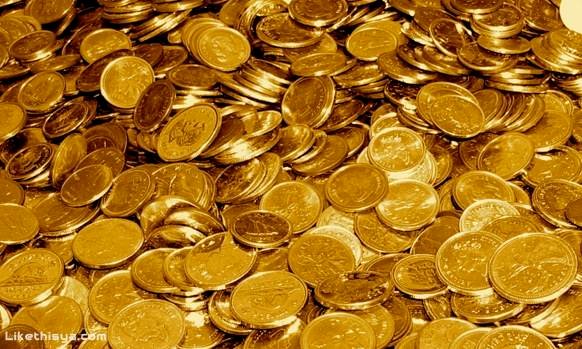UNDERSTANDING, FUNCTIONS, TERMS AND HISTORY OF MONEY
Currently money is the primary means of exchange used by almost all humans on earth. Money has a powerful influence on one's life. Besides money is also very synonymous with wealth and power. Even many who think everything can be bought as long as it has money, though the fact is not so. Apart from all that, talking about money issues should first understand if it's money? understand the money itself? as well as the history of money to this day.
 image source [1]
image source [1]
MONEY DEFINITION
- General Understanding: In general, money is an accepted means of exchange and facilitate the exchange process.
- Understanding Based Function: Based on the function of money is an object that serves as a means of payment.
- Understanding Under the Law: Under the law of money is an object that has been established by law as a means of legitimate payment.
- Understanding Based on Value: Understanding money by value has the understanding that money is a unit of calculation that can be used to express the value.
Understanding Money According to Experts
- A.C Piguo in his book "The Veil Of Money" is meant a medium of exchange.
- D.H Robertson in his book Money in question is something that is acceptable in payment to get the goods.
- R.G Thomas in his book Our Modern Banking explains that money is something that is available and generally accepted as a means of payment for the purchase of goods and services and other valuable property.
MONEY TERMS
There are several conditions for money to be used as a medium of exchange in the economy. Both technically and psychologically. Here are the terms of money.- Acceptability means accepted by all circles.
- Durability means durable that is not easily broken.
- Stability of value means to have a fixed value, which is meant that the value of money in this period have the same value in the future so that people believe saving money will not be harmed.
- Continuity of continuity of usage.
- Portability means that money is flexible, easy to carry anywhere. So when the owner does a great deal no trouble.
- Divisibility means money is easy to share, so when doing the smallest transaction, the money has a fraction and the value is not reduced.
FUNCTION MONEY
In modern economics there are 3 main functions of money that is as medium of exchange, as unit of account, and as a store of value (currency).
- As a medium of exchange means the existence of money will facilitate the exchange. With exchange money no longer have to use goods anyway but instead replaced with money. So the barter constraints can be overcome with the money.
- As a unit of account here money serves as a determinant of the value of various goods / services traded, shows the amount of wealth, and calculates the size of the loan.
- As a means of storage of value (currency) here money serves as a diversion of purchasing power from the present to the future. When a seller currently receives a sum of money as payment for the goods and services it sells, he can save the money for future purchases of goods and services.
HISTORY OF MONEY
Barter System
In the old days of human life is still very simple, at that time still no money. Because life is still simple man meets the needs just by farming, hunting, and raising. In order for their life needs are met people generally do not make a purchase but by doing barter. There is a exchange of crops with hunting results and other needs.The Emergence of Money
Along with the development of the era of barter system began to be abandoned because a lot of harm and less practical. Eventually man began to use certain objects as a means of exchange such as salt, shell, beads, copper, and other objects.
In the 17th century the history of money changed and developed. The exchange instrument used began to use metal. The metals used are gold and silver. Since then the exchange has been easier with money. Over time the use of gold and silver coins began to be replaced with paper money.
So about this the understanding, terms, functions, and history of money to the way it is today. Apparently the emergence of money does not necessarily arise by itself. The emergence of money through thought and diversion of functions from exchange to become more convenient and practical as it is today.